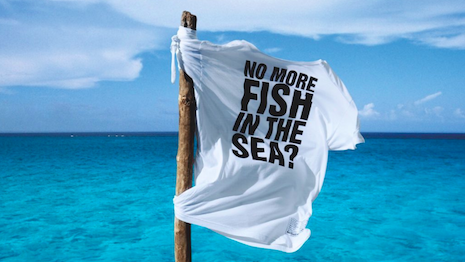A number of luxury brands are working to reduce or eliminate their use of plastic by the year 2025, according to a new report from the Ellen MacArthur Foundation.
The foundation leads the New Plastics Economy Global Commitment in partnership with UN Environment, aiming to target plastic waste and pollution by working towards a more circular lifecycle for the material. To-date about 150 companies have signed the pledge, including Pernod Ricard, Selfridges and Burberry.
Plastic prevention
The report is based on disclosures from 36 signatories of the New Plastics Economy Global Commitment.
While the commitment has set a goal of having 25 percent of plastics be recycled by 2025, IWC Schaffhausen has taken it a step further by planning to make 100 percent of its plastics out of recycled materials.
Diageo and L’Oreal are similarly looking to exceed the benchmark with 40 percent and 30 percent recycled plastic.
Other goals set by the commitment include transitioning from single use to reusable plastic and ensuring that plastics are recyclable or reusable.
L’Oreal is additionally working on plastic-free packaging and is working to educate consumers on recycling.
Both Pernod Ricard and Diageo have taken on plastic straws, eliminating them. Selfridges is similarly removing plastic cutlery from its stores this year.

Pernod Ricard is moving away from plastic straws. Image courtesy of Pernod Ricard
Selfridges is also working with its beauty brands to seek refill options, and is offering a refillable gin bottle through its in-house distillery.
In honor of World Oceans Day, the retailer also debuted a public drinking fountain outside of its London flagship. This latest initiative is part of Selfridges’ Project Ocean campaign, which aims to stop plastic pollution (see story).
Burberry launched a Plastic Footprint Mapping initiative that tracked its plastic use throughout its supply chain, including transit. The company followed this up by revamping its packaging, eliminating or reducing plastic on its shopping bags, garment cover poly bags and ribbon roll shrink wrap.
This new packaging launched in February and will be in all stores by September.
At Burberry, hangers are one of the three areas that contribute 80 percent of its plastic use. The brand is launching a hanger recycling program with its suppliers, which will allow hangers to be reused for transit.
Burberry is also working to create compostable options for its polybags and hangers.
IWC Schaffhausen is similarly looking into having consumers reuse or recycle packaging by returning it to the brand.
{"ct":"sUTGZj4UQwyBcrAeh+qoDZe0N0fv6t46mL96aWstmWisMtytDb3SdofFJT7ql3uJBxtwHsZB2M0PtC\/xqSJpKcEr2x5ZY069Ve8Q2KSmgylPTh1fhITcYlBVLkMDr4\/4UDBmkSwxx9chrvTfSCjxW+AO2BwwYj3bpPlKF10+YNxI6P7n3u\/+8efwCwtKVUD23fRxCPauIDx3B8O\/w+bY+63Ln\/vWRZdivYWDYw7M6rYFE0mFY+068U+KA82a0beqXwk+K96Dv+dn3abs64frfoCEi\/OQ7mA4nhLiyUpd5Pbr3v4B3l8oVvH7S1UXroxXkeTGwNxdcKwwxEQqse4NlTFXk0Sb\/yJTuVdCGIt3XuBzppRHqug6Wc4M99FkIfBNkDmASQaGAO4FMBPIkW50kjC6I0LZC0avQ7oqmykYaUYOSnc+7v9X2PZLl1jL3fOB1ulZ4SSNhhbLJW2Qhj8kpxLA+fI9Y9RfZFkq62p1rNFGLeCag2Ir3OddIYkFwI418JDI2yN3ci5pyC\/THUC7OCnx12JX5mjS\/7hq1wGnyQb1HZp10PQGjcxtvZe4TpL3EOoO3vnsxYnAx4C4aigDRrMKPzieobYerGvCvsJQFswt82aI7mTudxd5RevqTMIernzQP+aSHkZTrDJ06BQ1ddJoEbKp7lstoZh+3sJMYwu5wl4cyardeiBwvmQTgVEM6AVKhi4ZgePAtLlZRdD+wqdwjnLj3CtGjsiqj03F7Whj4CpBjP8z4X6mJZ0doJ4+SV\/IUrsTRzuZ2fjwlksF84cKnEVUUHYq7WuLBXWz\/7YOR3qld2Dqq25qrdMPL\/i7TjSc9sD9ieysV1fCB\/WRUKrRZNcyU+OLRqqyjqDTzutO\/ftiLUysy5YkxKEholoT2136xBDqcLO\/fpeemHH95UJIcUKhcaUmfZ7rtmAR3Vc0e9ujrmep0mFXOsUwYyvFxFuN7rQ7qJmd8gSYQbUuPo6E15v343CeheEHPlfcPS8cBsoNMzqnFtCmdDvRpsJOBsFhBtuppJjhI5oZyIP3YOjkYY\/oahdarZR2ykVH6xjotYpkUVtlDCiNSFT41WG+Jjl+WHt8E+jGElV9iPdlwMuRPFPV2bbKM3BOqJp3BNGxawOvDxyvtDXpBofMuDqhGbuo5DXh\/fARb5F55iK5o6AJZ7hmIk6cC0XsXSkl2HUDfNoNFAq6nU2pYpoxnONEo8oSC6qwDNX+3+wiQkOTgFIThpQsAZcBPzYfuiWGBsKMs7rqHmAIl3LRiSSr+N\/ms5VrdPMdEJRkzcqBo\/8vWQrXzoIgXWhywCMMtlUtdg9jb3nUfbDRJ9A7yvH313mZ5najhGqLrS2RyBPDNL9zlp2MG\/oE98KncTxaspx4gGNFy2pNWhUb3TtssV07G63B38Z3segX\/+HQylaW6nvV5gnE5SHsnV6FxYkol5nde0R8Sw8inYbVvnfeLEsfiq83DlQ6JAWTBj7RNxE7W1Smcog58Q0fnS5\/ojVq6U5Yf52j7pYPQepDP150QMd43ne2v0bIHwCTrhatkB\/FGEv65JFf6bMWzx2ZdxhqwRqxIVgtHUqT+EmeQBOn\/uiQA4\/BAW7hQEq+4363RkbdzKtNhUuOeaciQhd9X0Eca57jGLI\/K7LZd8FhS04hjb\/cglXhMmt+3OSfqwIarBsfrD63EZdaeEEqSeNFO+PNuploCT2UomJpj2djSvmjozQ+LCgjGNDt+n6Ub+kFUHFxVW8zKmTMmJW1oYpJXx0AqcuBdPKJYZYVv9QUwibA2F0yGhOJCaT8U\/cKaMB4vEc\/fcHeCom2igzMV8vR8uO9F4QXlEiNxYtJgpGtPwBgTQv2E2Econ4DwEHWY99rnijIz5CZ28YPXmeAnWD6qFe3y0eVT5s+Ql9yuT9R9CrR+debroFyFgSQOuPxE5K\/x+HfbXTAh\/w8Qm0FyblKBz0ms2BofUffD80VDwbv3nTCfM9AW+2Sec27kE5gW7\/D5xGQHo9DY+HmWX38E9ZEVX8gHkHyxxrgjDm\/MOEv25FIu1yavDWZHaeqWluordKcVNVGUSC8QAWLTMijbjHs7IEYuvYoyWe8XVicgAsTVyl66oeyyfqJnwMKdiXrlEpaeYVC0TarOI5Bn0CYVS+0HoZd7\/QFL103jKgdCsk7oV1uH5fxse6T\/btCsSmRIaNRyJaZBjV4IpgSyi1thRAR3PhIDClyVfBT1ADYFgITQB6gTUA9TcyZKXvcPgd\/e9+zgpTgURTLvxNc\/Xmb02kAUEP06\/SJevRruwEql46cO35UVIuuURfZkP7T02lkg8TZUgFTng5bIvvVJVTONSAvI274dTDCYgoOmfmmWv3+DwxNAwDaBv9kJrAFEvQySs1n\/YAm2gGjaOT8nGpnS3FVeWQcgpSjolfmlVNGo8YeR03Sn3HB1U7Mo\/dFXPQXO5dXBo8iAx0t92f7DouR8\/k\/dZyK0ZGuFnLdcB7XKwwPONkmtB\/Gd8+G0LO3jXUOPsNLJUb5MlxiRp9xi\/KA5kzf7pGc3ikYbVvKXZ36wunGT3wwTP8tLNdRZV5556t0NL66FahcrlQMYSyJkbpQ+uwx\/x1ypstVpEz2jad2bqTukG5i5JImblHdLLmw3Acwn6gcNZfUsX\/RrtqCXhriuGGYzbmYN2WPnAjs9E1kqvtAvSZtmfvrnDznw3COYpovrTMdorkyhjaYiqVKO79YaUgbl0TD9VPfXvM7z17FDK\/bUWSmuc854N4ActocCCmlDgKwFpbDl+Ze4xbqrMBQ+ugTpfIG6h4Yce\/GkfpAybn3SVf1oU89c2ksoRV72CdvhyTLZ3JYgtmBeNRsCxXLDDdPrdnmsXTQAd48oM4+Rz5pmgev0y+g7NTgrkcRcSMBxy33Hf6H6Hy4fSyjXqxdh6LpEDe7ba8rcpgz5ntntIIY3WrNOm+9u92C04kdPU3lZTiEDj6ijZmK6XqFR7nIw\/EmVGTjM1Q7VsJpySTnfQOM\/FCHkjmKbHCy5\/kTmE6HFe3fKljiqhBy0ih6IjSEUjXnE+u92fylnSSTMz55iKlwhyLNBm+Xx0TLYXzpMjZEazLCMqjN0g+njZTNu1WRg2+ZPmSe9c5fwmc1+c08vqIPrRRUMU0vjIbHTtcAqlbFvMuoCBtRbJMn4kkUYrpXdcuCL3X3eIsArwl+ZW1w6nvktS5v8xBassgiY0yEXUzTh5TzsC4Pn2Up4wNOVmxfFm+4zkvN3PxlicOXR9MY1R5fzWKt9noEzPq8Rnw5jlmKx4NNZVgbG6UJiY2Jupu2G2DhGJrca4SQv4IQc9uj3kIww9Lw2L0G2Wz3Up+UU\/rMm9Bcp01Mi8\/ZNjEDspznYR0d4O\/C7kNm3dWwgl1AXbBFHXsfD7MM\/QC5\/1Wq6ZqWsvKs7fcrB73lmisa9Tzz3WayD2MqeQalGk0jriLtQUOU05h\/cWaXFU4SndS+mz50e\/gglp8WQms\/LqxNpEqXi9HAVrnD2AONPwQ25Z0YDA2zXp26C\/2x\/yqY9eDpY4SqkPU4l41lxWxpAHoVI9Yx\/8euFm3FtME5iKTZzQzE8AzYE6ByabQ\/2mrl+6aN5wsy+mFhr99AcCA+VKCsXElVOHywUCnxREoi3sz\/yKuo8v3oPo5+jTpLtVGG6yvTe0v3W+R6V2\/\/S0nSyydDRJjMfokhLqBlxmHDySiVYm1qX1QGQPPKwxNaCmkd0mSHhdZHtdFnkrPvimoDnK0pvZlVMk0z\/FnxxMnCxT3r6soaRdMHdBWLa4jgahTojVIVmy64nSumcuqmSoDBarj7tp5sPerrbiNDt5a0aWHH7xpmgsrggF0+RkSRCDs21BpCW1g7AdVkAuIzSFwAe9FBO0\/9zXQi76XSDer8euM379RPlhCYff37t11G2f0NQAVL0ltWfb5zxQpkOTvSzsR50PJAsdDFODbYlGvENCRBpUQc6Rqy9knbphYjyy5bkf8ASLC5Zj9NvHe1HGaVKM2lPbEi1t50ctXMESonXnXttGj3pgno4vk7U7af1hN9Ytp1Ip0RgQ1mKTHqFDjgrCqiAcbHrxP3jmhoqAJLQj9C2+2mnKmcTneZeGCmsTBNwf7A8zWw9O915SSC1R\/zAd3hFDM+b9zDXA1UwFylL8MHlsSkiB\/DwK6UaPRAUDJvjkXegQY9BxdaxnddwxfB2WU1He8JkFwfeoohcMNxjm1TpIHwCI8RxbfIpPqi2rKle6SZ302LQZEApgKiME6N20\/5npCX+YAXFgtSCVAZqbhm699lByDYvraha7zH4JufUMDWO6yTxFI7oGbq\/Ng3ThYm1ePos1JGXxyZxjw\/CLdvNcH9pPqqPcShQ6zdLwYwgCK0VCsqGjfenZFypxiphKUtoqbxv78NvbWEWKYhelozFXaijEXcrpe0Cu1g7ahQhoc7MKLf4wuxLmGg6NVSRA==","iv":"0fd7713a4334bcaa16a1e4b9282cffc2","s":"8d09b9c0d0608cae"}

 Selfridges is no longer selling plastic soda bottles. Image credit: Selfridges
Selfridges is no longer selling plastic soda bottles. Image credit: Selfridges